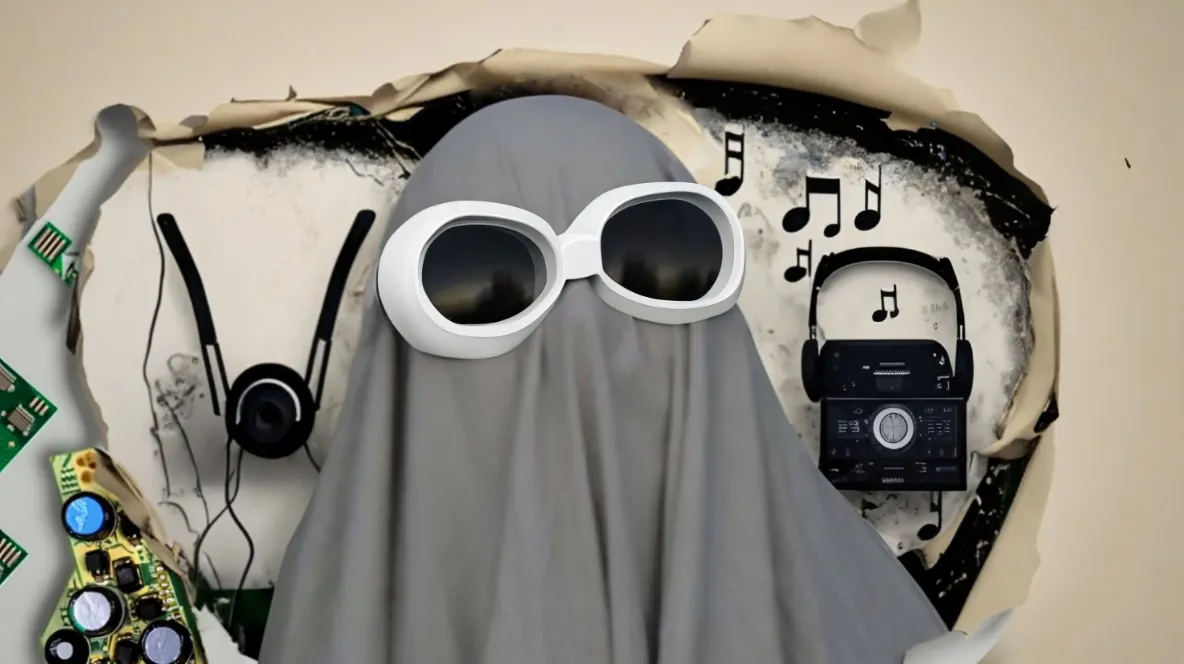In the months following ChatGPT’s seismic debut last November, apocalyptic fears swirled of AI’s potential to destroy almost every human profession imaginable. The entertainment industry ranked high among sectors most preoccupied with AI’s looming threat; but given the stilted, obviously synthetic quality of much GPT-crafted creative output, many assumed that the arts would be—at least for now—a bit more insulated from the impending robot revolution.
Then came the anonymous TikTok user hidden behind a bedsheet and sunglasses, who, with a two-minute song, single-handedly changed that calculus. For the meaningful ways in which this creator, Ghostwriter977, altered the trajectories of the music industry, American politics, and AI discourse in a span of mere months, he is SCENE’s Person of the Year.
It all started in April, when Ghostwriter posted an AI-generated song titled “Heart on My Sleeve” that purported to feature Drake and The Weeknd collaborating on their first track in 10 years.
It wasn’t the first song to impersonate a famous artist with emerging tech—far from it. But whereas most past AI musical experiments could pretty easily be dismissed as ersatz novelties, “Heart on My Sleeve” was different: It was actually good.
Good technically, good lyrically, good musically; good enough all around that it felt—beautifully, or terrifyingly—like it had been thought up, written out, and recorded by Drake and The Weeknd themselves.
That caused some problems pretty quickly. Within days, the track had racked up not just hundreds of thousands of listens on YouTube and Spotify, but also numerous, furious claims of copyright infringement from the artists’ record label, Universal Music Group (UMG).
Due to those legal threats, which condemned “Heart on My Sleeve” as a “deepfake” and a “fraud,” the song was removed by streaming platforms almost instantly—but not before prompting a global reappraisal of the possibility of artificially generated art.
“Best Drake song in years and he didn’t even write or sing in it,” one YouTube commenter wrote.
“KEEP THIS SONG ON HERE WHO CARES WHAT DRAKE SAYS HE AINT MAKING FIRE LIKE THIS ANYMORE,” another demanded of YouTube’s content moderators.
How much of the song was actually fake? What does “fake” even mean in such a context?
The lyrics, the beat, the melody, even the singing were all real, it turned out; Ghostwriter claims to be a well-known songwriter-producer when he isn’t hiding behind a bedsheet and sunglasses. Only a final AI-generated layer transformed Ghostwriter’s vocals into near-perfect impressions of two of hip-hop’s biggest stars.
Undoubtedly, “Heart On My Sleeve” would not have resonated with audiences if the track’s production and lyrics weren’t bursting with distinctively human originality and flair. But lacking the cutting-edge technology that made it so uncannily familiar, the song may have been doomed to obscurity, lost amid the endless churn of new music.
In September, Ghostwriter and the song reentered the public conversation when he submitted it for Grammy consideration. Amazingly, the notion that the music industry would reward an AI-generated track denounced by the artists it mimicked wasn’t actually preposterous.
Harvey Mason Jr, CEO of the Recording Academy, which runs the Grammys, explicitly clarified that “Heart on My Sleeve” was “absolutely eligible” for a Grammy. Mason previously told Decrypt that he believes AI has a key role to play in “amplifying creativity” in music.
But alas, another backlash ensued; Mason quickly turned around and reversed his opinion. The AI version of the song was rejected by the Recording Academy.
Again, though, the cat was already out of the bag. Art made with AI was now driving culture, even if cultural institutions wouldn’t acknowledge that reality. It was only a matter of time before those institutions would have to answer the knock at the door.
In October, the U.S. Senate proposed a bipartisan bill that would make non-consensual filtering of a person’s likeness through AI illegal under federal law. The bill wasn’t just an implicit reaction to projects like “Heart on My Sleeve,” but an explicit response to that song in particular. A joint statement from the lawmakers who sponsored the bill cited “Heart on My Sleeve” as the only example of the sort of art the “No Fakes Act” would outlaw.
This year was defined in large part by a collective attempt to process how AI will change humanity. That threat loomed large across art and culture; nowhere more visibly than in Hollywood, during historic, concurrent writers’ and actors’ strikes. But in those labor actions, AI was still a theoretical beast on the horizon—one requiring a codified, industry-wide brace for impact.
“Heart on My Sleeve” was different. Ghostwriter’s song, more than any single piece of popular art made this year, proved in practice the potential for meaningful art to incorporate artificial intelligence. To some, it proved the danger of such a premise.
Most importantly, Ghostwriter’s work offered a roadmap for art’s relationship to new technology that cut through alarmist visions of a dystopian, robot-controlled time to come.
AI, like any technology that came before it, will undoubtedly give birth to new artistic mediums and movements heretofore inconceivable. But laptops are not Picassos, and probably won’t be for the foreseeable future. Good art requires human perspective, and soul.
AI can accentuate that soul. A fruitful artistic relationship between man and machine is not just possible, it’s the industry’s path forward. With “Heart On My Sleeve,” Ghostwriter proved that—beautifully and provocatively.
Edited by Andrew Hayward

